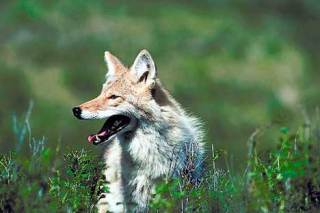Kent resident Pat Walsh can no longer scare away the coyotes she spots near The Lakes neighborhood. And that worries her.
Walsh, who takes daily walks through her neighborhood north of James Street, west of 64th Avenue and south of South 228th Street, wants residents to know that about two weeks ago she saw the aggressive side of a coyote.
“I wasn’t really concerned until I yelled and clapped for them to take off, and the last few months that has not happened,” Walsh said Tuesday at her home. “I had one that showed its teeth, stood and watched me go by.”
There have been no reports of coyote attacks against people in Kent that have been made through the Kent Police or the state Department of Fish and Wildlife. But Walsh wants people to be aware of the coyotes, to help avoid any potential incident.
“The worst thing is they are not scared of me anymore,” said Walsh, who also has spotted the crafty carnivores near the popular Green River Trail.
Residents who see coyotes can call the Mill Creek regional office of the Department of Fish and Wildlife at 425-775-1311 to report the sightings, said Craig Bartlett, public information officer for the department.
“They get about two dozen calls of sightings a day from King County to the (Canadian) border,” Bartlett said. “But those are all just sightings.”
State officials only send out Wildlife officers if pets are being preyed upon or a person is bitten.
“We don’t respond to sightings because they are so many of them,” Bartlett said. “Attacks are quite rare. We had one incident in 2006 in the region where a couple of kids were bit in Bellevue. But we haven’t had any biting incidents since.”
Fish and Wildlife officers euthanized two coyotes after that Bellevue incident.
“They are not normally aggressive toward humans but they are toward pets,” Bartlett said of coyotes.
The coyote is a medium-sized canine with pointed ears, a bushy tail and a slender body with brownish and gray coloring. An average adult male weighs 25 to 40 pounds. There are an estimated 50,000 coyotes in the state.
Kent city workers do not respond to wildlife complaints.
“We refer people to the state Department of Fish and Wildlife,” said Michelle Witham, city public affairs manager. “They handle coyotes. But we know coyotes are around.”
When city park maintenance crews cut the grass at Clark Lake Park on the East Hill, they have seen coyotes run behind the mowers to catch the mice that are exposed because of the cut grass, Witham said.
King County Animal Care and Control handles only domestic animals, such as cats, dogs and livestock. Any calls from residents about deer, raccoons, coyotes, cougars and bears would be referred to the state wildlife department.
Walsh, who has lived in The Lakes for 12 years, first saw coyotes about five years ago. She usually spots them in the early morning, but recently saw one in a small wooded area near Russell Woods Park along the Green River Trail, just south of the Jackson Bridge on South 228th Street.
About a month ago, Walsh saw a coyote start to chase a group of ducks crossing the street near her home.
“I yelled, and he turned around and the ducks took off,” Walsh said. “But then I heard three or four coyotes howling. They didn’t like that I stole their breakfast.”
Paul Petersen, Kent Police spokesman, said police will respond if a coyote acts aggressively toward someone. But he said most 911 calls about wildlife are dispatched to Fish and Wildlife.
“I don’t recall in my 20 years a case of a coyote being aggressive,” Petersen said.
When told the coyotes seem to have less fear of people, Petersen wasn’t surprised.
“Some of that might be the animals are getting used to us,” he said. State officials advise residents to make sure pet food or loose garbage isn’t placed outside, because that attracts coyotes.
Coyotes are treated as nuisance animals by the state, similar to raccoons or skunks. That means officers are unlikely to respond to a call about a coyote unless it is behaving aggressively toward someone or attacking pets.
“If they have a cougar or bear in the backyard, we respond with an officer because they are considered dangerous animals,” Bartlett said.
And if residents want coyotes removed from their neighborhoods, private companies can be hired to remove the animals.
“People in the neighborhood would have to make that decision,” Bartlett said.
Web site: www.wdfw.wa.gov/wlm/living/coyotes
Phone: State Department of Fish and Wildlife, 425-775-1311
Talk to us
Please share your story tips by emailing editor@kentreporter.com.
To share your opinion for publication, submit a letter through our website https://www.kentreporter.com/submit-letter/. Include your name, address and daytime phone number. (We’ll only publish your name and hometown.) Please keep letters to 300 words or less.

